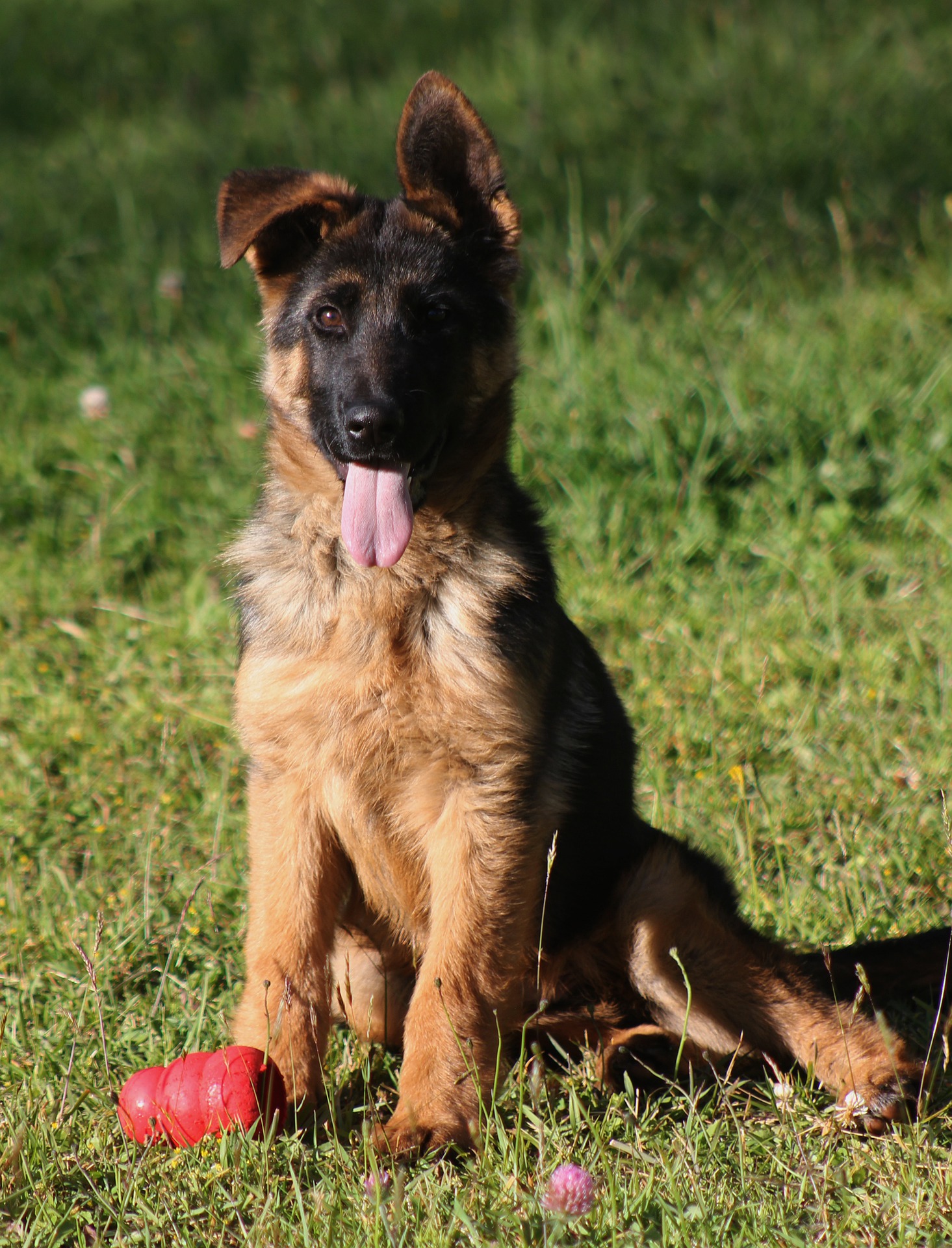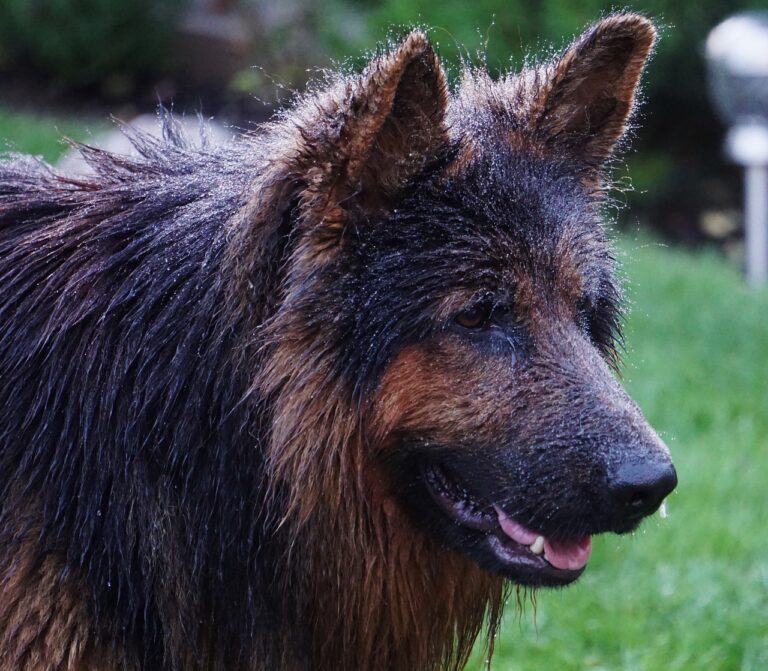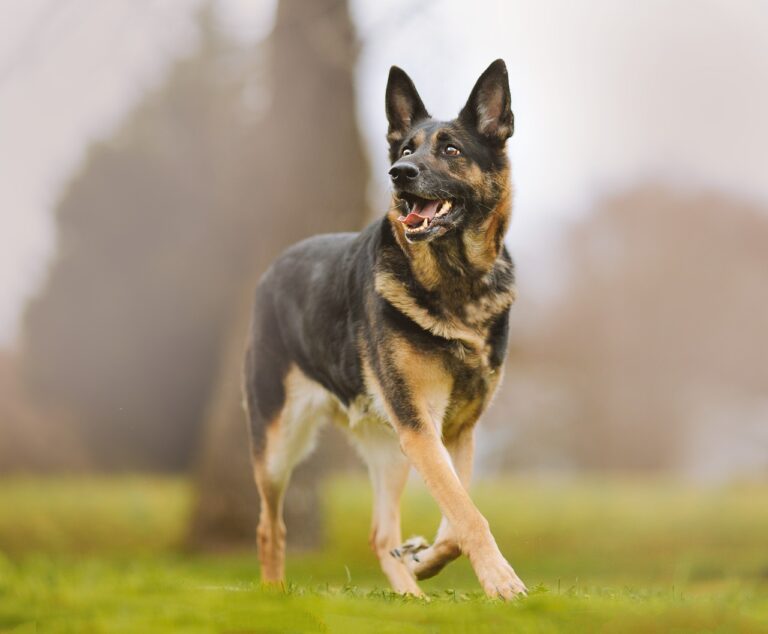
So you just got a cute little German Shepherd Puppy, and you’re so excited to be a new mum or dad. As a dog parent, your little GSD pup has captured your heart. Those adorable puppy eyes, accompanied by the slight head tilt, are captivating! Although you’re ecstatic about your precious little one, you probably feel a little worried. How would you raise this bundle of joy embodied in the body of your little GSD?
Well, though there’s no such thing as a perfect GSD puppy, you can, however, raise a well-mannered or cultured GSD, making it an ideal puppy for your home. The best way to achieve this is to train your German Shepherd puppies well. When you do this, they become well-mannered and are fun to live with. But raising a well-mannered and almost perfect German Shepherd puppy takes time and effort. This articles main focus is on everything you need to know about raising an excellent GSD puppy. Here are ten things you need to know about raising an ideal GSD puppy.
- Get different places to train your puppy.
- Teach your puppy reliable recall.
- Teach your puppy to have bite inhibition.
- Socialize your puppy.
- Potty train your puppy.
- Train your puppy to use the crate.
- Train your puppy to ask for permission.
- Use food rewards.
- Train your puppy to be obedient.
- Provide your puppy with proper nutrition.
Topic Categories
Before delving into how to raise a well-behaved GSD puppy, some essential questions might have popped up in your mind. You might be wondering, why should you get a GSD pup in the first place? What do you need to train your GSD puppy? When should you start training your GSD? Are GSDs easy to train?
Why Should You Get A GSD Puppy?
GSD puppies are protective, loving and loyal pets. A well-bred GSD wants to please its owner, thrives on praise and is very intelligent; these three things make them trainable. So, if you can devote the right amount of quality time to your dog breed, especially during its crucial first year, you’d raise an excellent guard dog and family pet. However, it can get boring if you are too busy to dedicate time to your GSD. Once your GSD gets bored, it can get destructive.
Are GSD Puppies Easy To Train?
German Shepherds are very obedient and intelligent. Because they easily retain lessons taught and are fast learners, some say they are easier to train than their contemporaries. So, yes, GSDs are incredibly easy to train in a risk-free environment; you have the correct information and enough time to dedicate to training them.
When Can You Start Training Your GSD?
You know what they say, “it’s never too early to start raising your child.” Your GSD pup is like your child. Start to train them from infancy. Catch them young! Just as a child’s brain is likened to a sponge because it can absorb or grasp whatever you teach them, your GSD puppy has the potential to absorb whatever you teach it.
_____________________________________________________________________________________
The fact that your dog breed is well-behaved doesn’t make it less of a guard dog. An excellent GSD can be a loving, loyal pet and a protective, fantastic guard dog. It knows when to switch roles. It won’t attack a well-meaning and harmless stranger or, worse, a family member. You can’t overemphasize the importance of training your puppy right. And it would be best if you started from infancy. To raise the perfect GSD puppy, you need to do the following:
1. Get different places to train them
Dogs aren’t humans. If you tell a child to sit on a chair, that child is intelligent enough to generalize the concept of sitting on a chair to any other situation. So if you tell the child to sit in his bedroom, and there is no chair, that child would sit on his bed or any other object that can serve as a seat. But dogs aren’t intelligent enough to do this. You’d have to repeat one instruction in several places. For instance, if you want to teach them to sit, you’d repeat “sit” on the lawn, bedroom, and kitchen.
Fortunately, GSDs are highly intelligent, so you might not need to repeat as much as you would have for other dog breeds.
2. Reliable recall training
You should train your puppy to come to you when you call on it as soon as possible because It takes patience, lots of time and practice.
Dogs are constantly distracted by one thing or the other, so it can be challenging for them to almost always leave what they are doing and come to you. But you shouldn’t give up! Teaching them this skill can help save their lives someday.
3. Teach them to have bite inhibition
Dogs are born with sharp teeth and use them a lot when playing. Puppies are still learning to use their teeth. So even though they are play-biting, they might bite you so hard that you bleed or get scratched because they are yet to figure out how to reduce the pressure of their teeth on your skin. But this is not the end of the road. You can teach your puppy how to play with its teeth, but this time, gentle enough not to hurt you since you can’t stop them from biting you.
Depending on the dog, there are several ways to teach them.
- If they bite on you too hard, you can make a loud sound like “ouch!”. Although, for some puppies, when you make a loud noise, they will get worked up and most likely bite you. If this happens, walk away or put the puppy in its crate to stay alone for some time.
- Give your puppy something else to chew on, like a toy; this helps them know it’s normal to bite. You can offer your puppy a toy when biting your toes or fingers.
- You can also stop playing with your puppy when it bites you hard during a play session; this helps them know over time that there’s a consequence for their actions. There’s no reason to hit them. Just turn around and put your hands under your armpit. ________________________________________________________________________
4. Socialize your Puppy
Socialize your GSD puppy as early as possible, and don’t let it get passed 12-16 weeks because their socialization window closes by this time. This period of your puppy’s life is a crucial stage. After this stage, your GSD puppy’s socialization period will be closed forever. If you miss socializing your pups during this period, your chance to raise confident and friendly dogs significantly drops.
At this crucial stage, expose your puppy to different people and non-threatening situations to help it build its confidence among friendly strangers and not be aggressive or fearful. A confident puppy is a happy one. And good socialization equals confidence. So proper socialization is imperative for your GSD puppy.
Expose your GSD puppy to the daily routines you want them to do when they become adult GSDs. So introduce them to some essential tools for grooming, like nail clippers and combs, at an early stage.
5. Potty train them
Your GSD puppy can’t tell you when nature calls. So it might be a hassle to know when to take them out to do their business or how many times to do this. Well, puppies need to answer nature’s calls more often than adult dogs, so have these guidelines in mind:
- When your GSD puppy is two months, take it out every 2-3 hours to go potty.
- For every additional month, add 1 hour to its potty time
- Then when it’s six months and above, you can take it out every 6-8 hours.
Also, take your puppy out to do its business immediately after a meal, sleeping, and after a playtime session. Calmly reprimand your puppy if you catch it doing its business in the wrong spot and redirect it to the correct location.
6. Crate training
Dog crate training is vital to prevent your puppy from puttying outside and tearing things up. A crate can help your puppy feel secure as your dog knows that the crate belongs to it; it’s its safe space and can have its alone time. So, train your GSD puppy to use the crate early because it can help your puppy calm its anxiety.
To prevent your GSD puppy from developing separation anxiety, keep it in its crate when you’re doing chores and want to feed it. Ensure to start early so your puppy can get used to having some time alone.
7. Train them to ask for permission

A dog that asks for permission is an obedient and safe dog too. So, train your GSD puppy to seek your consent before chasing anything like another dog or animal. It’s important to note that you are not commanding your dog to ask for your permission. Instead, you want to teach your pup to always look at you as if asking, “can I go play with the other doggy?” like you would like your child to do.
It’s essential to be observant and always pay attention to your puppy so that it doesn’t decide for itself when you don’t respond.
8. Use food rewards
Some say it is wrong to use food rewards because your puppy would only obey you when you have food rewards with you. That’s not true. If you use food rewards correctly, your pups will obey you with or without food rewards.
A good trainer motivates h/her puppy with the things that appeal to it. So when you find what works for your GSD puppy, use it. It may be food, toys, walks or even petting. If you’re using treats as rewards;
- Get small-sized treats in plastic bags when you start training your GSD pups because you’d reward them too often.
- Get different types of treats ranging from your pups’ favorite to least favorite, to healthy treats, to its regular kibbles, to yummy treats in the plastic bag. Save your puppy’s favorite for excellent responses.
- Reward 100% when you start teaching your pups new behavior. And reward 100% every time you add something new to your teaching. So you teach your puppy a new behavior-100% reward, tell your puppy to do that behavior in a new place-100% reward, your puppy does that new behavior when distracted-100% reward.
- Then you can slowly and randomly reduce the dog treats when your puppy learns the behavior, usually when your puppy can respond correctly, eight out of ten times.
9. Obedience training
To raise an obedient GSD adult, teach your GSD puppy simple commands like down, stay, and stop; from infancy. You can also enroll your GSD puppy in puppy obedience classes. These classes not only teach your puppy obedience but helps in socializing your pups as well.
10. Provide proper nutrition
Poor health can lead to behavioral problems in your GSD puppy since it has no other way to express itself. So ensure that you provide your dog with the best nutritiously balanced diet it needs. Like humans, dogs need quality food to remain healthy, strong, and fit. So go out there, and get the best dog foods you can lay your hands on. Ensure that these dog foods have vital ingredients like organ meat, meat, healthy fats, carbohydrates, vitamins, and minerals.
To learn more about how to provide your GSD puppy with the best nutrition, kindly click on the link below.
Qualities you need to have to raise a GSD puppy
Patience: You don’t need a soothsayer to tell you need patience to raise a puppy. You need patience to do virtually almost everything, if not everything, in life, especially long-term projects.
Dogs are like children, and if you’ve ever had the chance to stay with children just for a day, you know damn well that you must clothe yourself with patience to stay with them. Likewise, to raise a well-behaved GSD puppy or any puppy, you need patience because dogs can be as mischievous as children. To train them to learn a new behavior, you need patience also.
_________________________________________________________________
Persistence: Persistence is a quality that allows you to continue doing something even though it’s difficult. So yes, you must be persistent in teaching your dog bite inhibition, potty training, reliable recall and many other forms of training.
_________________________________________________________________
Self-control: It takes self-control NEVER to hit your puppy when it misbehaves or makes mistakes.
_________________________________________________________________
Love: Love bears all things. It takes love to calmly and tenderly correct your dog even when you feel like hitting your head on the wall. It takes love to wake up early to feed your puppy. It takes love to take your puppy for its daily walk, even when you’ve had an exhausting day at work or school.
_________________________________________________________________
Conclusion
Rome, they say, wasn’t built in a day. So don’t expect to raise a perfect German Shepherd puppy overnight. Remember, there is no such thing as a perfect GSD puppy because perfection doesn’t exist among humans, let alone animals. But you can raise an almost perfect GSD puppy; it takes hard work, time, practice and devotion.
Before getting a GSD puppy, please research, ensure you have what it takes to raise a puppy financially, and ensure you have the time and the qualities you need to raise a well-behaved GSD puppy.
But what if you want to start breeding your very own line of German Shepherds? What are some things to keep in mind which can ensure you succeed in the process? click the link above to find out.
________________________________________________________________________



